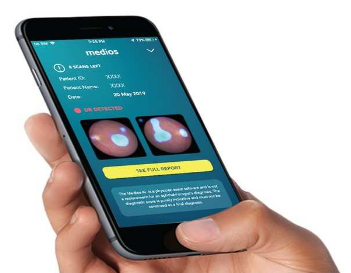Bengaluru: Diabetic Retinopathy (DR), is asymptomatic and affects nearly 20 per cent of the 70 million diabetic patients in India.
Timely and accessible DR screening can enable early detection, preventing needless blindness. Nearly 70 per cent of the population, especially those in rural areas lack access to specialists, given the very low specialist to population ratio of 1:100000 in some areas.
A landmark study published in the August issue of JAMA Ophthalmology (Journal of the American Medical Association), reports the feasibility of using a smartphone-based retinal camera with the world's first, in-built automated, offline Artificial Intelligence (AI) algorithm, the MEDIOS-AI, designed by Bangalore-based Remidio Innovative Solutions, to implement sensitive and scalable screening models for DR.
A team from Aditya Jyot Foundation for Twinkling Little Eyes, Mumbai, led by Dr Natarajan, President of the All India Ophthalmology Society, has till date screened more than 1300 patients with diabetes mellitus in civic dispensaries in Mumbai for DR and validated the diagnostic accuracy of MEDIOS-AI to detect Referable DR, a condition requiring immediate specialist consult. The AI instantly provides a report in less than 10 seconds, on the smartphone.
Florian Savoy (VP, Data Sciences and AI) and Bhargav Sosale (VP, Software Design), the architects of Remidio's smartphone-based AI solution, suggest that the novel, offline AI platform is 'extendable to Glaucoma, AMD and other sight-threatening chronic diseases'.
The images were captured on Remidio's smartphone-based, non-mydriatic, portable camera, the NM-FOP 10 and subjected to automated analysis by MEDIOS-AI, with simultaneous grading by vitreoretinal specialists. MEDIOS-AI relied on 2 convolutional neural networks, based on the MobileNet architecture - one assessing the image quality, and the other separating healthy images from images with referable DR (RDR). The clinical sensitivity and specificity of the MEDIOS-AI algorithm were found to be 100per cent and 88.4per cent for RDR, 85.2per cent and 92.0per cent for any DR respectively, exceeding US FDA's superiority endpoints of an RDR sensitivity of 85per cent and specificity of 82.5per cent.
Dr T Y Alvin Liu, MD, Assistant Professor of Ophthalmology at Johns Hopkins Bloomberg School of Public Health, in an invited commentary, calls the study 'paradigm-shifting'.
"The study paves the way in implementing large scale models for screening for DR, even in locations with no internet infrastructure. This is a step ahead of the approach taken by Google and other AI companies that need their AI models to run on external servers, necessitating internet access," said Dr Natarajan, MD.
"Technologies like Remidio NMFOP and Medios Offline AI, are necessary to move screening closer to the nearly 400 million patients at risk of blindness globally, due to chronic, asymptomatic conditions like Diabetic Retinopathy," said Dr Anand Sivaraman, CEO, Remidio.

 The MEDIOS-AI, designed by Bangalore-based Remidio Innovative Solutions, will implement sensitive and scalable screening models for Diabetic Retinopathy.
The MEDIOS-AI, designed by Bangalore-based Remidio Innovative Solutions, will implement sensitive and scalable screening models for Diabetic Retinopathy.









.jpeg)













.jpg)
.jpeg)





